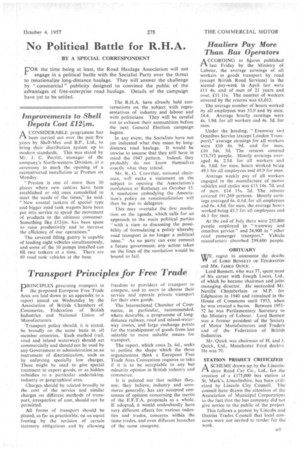Transport Principles for Free Trade
Page 45

If you've noticed an error in this article please click here to report it so we can fix it.
PRINCIPLES governing transport in the proposed European Free Trade Area are laid down in an appendix to a report issued on Wednesday by the Association of British Chambers of Commerce, Federation of British Industries and National Union of Manufacturers.
Transport policy should, it is stated, . be broadly on the same basis in all member countries. Each method (rail, road and inland waterway) should act commercially and should not be used by any Government or administration as an instrument of discrimination, such as by enforcing specially low charges. These might be used to give special treatment to export goods, or as hidden subsidies to a particular undertaking, industry or geographical area.
Charges should be related broadly to the cost of the service and similar charges on different methods of transport, irrespective of cost, should not be permitted.
All forms of transport should be placed, as far as practicable, on an equal footing by the revision of certain statutory obligations and by allowing freedom to providers of transport to compete, and to users to choose their service and operate private transport for their own goods.
The International Chamber of Commerce. in particular, recommended, where desirable, a programme of longdistance railway, road and inland-waterway routes, and large exchange points for the transhipment of goods from less suitable to more suitable. means for transport.
The report, which costs 2s. 6d., seeks to outline the shape which the three organizations think a European Free Trade Area Convention requires to take if it is to be acceptable to any but minority opinion in British industry and commerce.
It is pointed out that neither they, nor, they believe, industry and commerce generally, has any accepted consensus of opinion concerning the merits of the E.F.T.A. proposals as a whole. If adopted, it would undoubtedly have very different effects for various industies and trades, concerns within the same trades, and even different branches of the same company,




















































































































